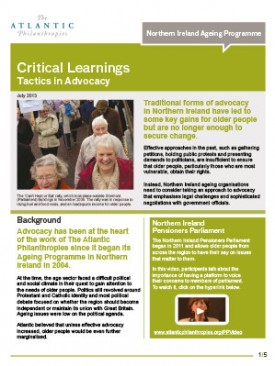Critical Learnings: Social Economy
Resource type: Research Report
Brendan Murtagh |
Age organisations can make use of market mechanisms to resist welfare reductions and support the resilience of the most excluded old, according to this summary of an evaluation of the social economy ageing programme funded by Atlantic.
The social economy approach provides an opportunity for the age sector in Northern Ireland and beyond to reduce its dependence on grant funding while providing new skills to the people they are serving.
Developing an economy for and by older people will require new cultures, skills, finance and organisational formats. But an investment in this area has already shown that it is possible. This summary lists action steps that ageing organisations can follow to take more advantage of the opportunities of the social economy.
> Read the summary (PDF)
Learn More
For more information on evaluations and other findings about social economy, see these reports:
- Social Economy Age Programme Evaluation (PDF). This report provides additional details about the evaluation of Atlantic’s social economy investments.
- Charity Bank Evaluation (PDF). A formative evaluation of a project to develop knowledge and skills to enable the age sector to increase their financial resilience and operational independence.
- Kestrel Evaluation (PDF). Evaluation of a project to provide mentoring, training, and skill development to increase the economic security of older people.
- Ignite UnLtd Evaluation (PDF). Evaluation of a project to provide people age 50 and older with mentoring to develop a social enterprise directed at helping older people.
- Ignite Qualitative Analysis (PDF). Case studies of people over 50 who have created social enterprises.
- Ignite Development Concepts (PDF). A guidebook on how to develop one’s own social venture.
Atlantic and its grantees commissioned these reports and summaries.
